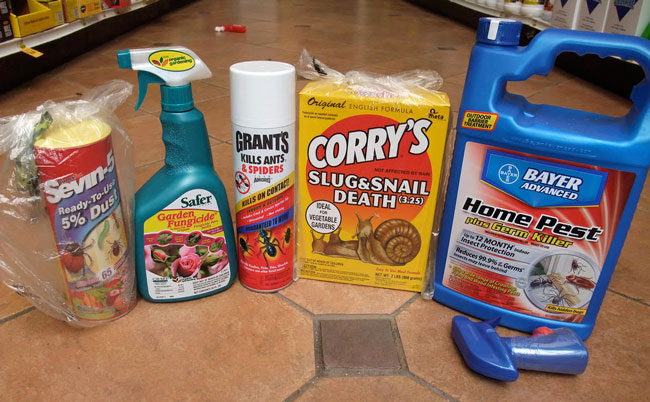Know the “Don’ts” When Using Household Pesticides
By Chris Williams on August 1, 2013.

Don’t Use Pesticides For Uses Not on the Label
Don’t assume that a pesticide purchased for one type of treatment can be used in another setting – without first checking the label. Pesticides with names and ingredients that sound similar may be intended for very different uses. It’s against the law to use a pesticide in a manner not specifically listed on the label.
Don’t Use Outdoor Chemicals Indoors
Many chemicals intended for use outdoors are dangerous to use indoors because they will remain toxic longer inside than they would outdoors. Outdoor pesticide application methods and equipment can be very different than indoor application methods. The label will tell you if the product is for outdoor use only.
Don’t Assume That Twice as Much is Better
Spraying or applying twice as much pesticide won’t kill that pest any deader. Too much pesticide in the air or on surfaces can put your family’s health at risk, and can result in an explosion if total release aerosols (foggers or “bombs”) are overused. Using too much pesticide outside can harm the environment, wildlife, even your pets. Applying more pesticide than the label directions indicate is a waste of time and money, and can be dangerous. Always read and follow label directions.
Don’t Transfer Pesticides to Other Containers
Always store pesticides in their original containers. Transferring them to containers that look like food or drink containers can result in accidental poisoning, especially for children. When you transfer a pesticide to a new container, you no longer have at hand the all important label with use directions. Conversely, never use an empty pesticide container to store anything else. No matter how well you wash the container, it can still contain pesticide residue that could be harmful.
Don’t Mix Too Much Pesticide at Once
Mix up only the amount that you will use at one time, especially if the pesticide must be mixed with water. Having too much pesticide mixture on hand means additional storage problems and increases the risk of accidental poisoning. Pesticide mixtures have a limited life; you may find yourself applying a premixed pesticide that is no longer effective.
Don’t Just Dump Pesticide or Pesticide Containers in the Trash
Always read the label on the pesticide container to find out how to dispose of the container or leftover pesticide. Some empty containers can be carefully rinsed, wrapped, and disposed of in household waste if the label allows. Many communities have household hazardous waste collections that will accept unwanted pesticides. Call your waste disposal authority for information about such a program in your community. Photo credit: OSU Master Gardener / Foter / CC BY-NC-ND